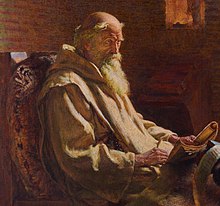Bede
| Saint Bede the Venerable | |
|---|---|

The Venerable [St.] Bede Translates [St.] John by J. D. Penrose (c. 1902)
|
|
| Doctor of the Church, Monk, Historian | |
| Born |
c. 673 not recorded, possibly Monkton, Tyne and Wear, England |
| Died | 26 May 735 Jarrow, Kingdom of Northumbria (contemporarily Tyne and Wear, England) |
| Venerated in | Roman Catholic Church, Eastern Orthodox Church, Anglican Communion, and Lutheranism |
| Canonized | Declared a Doctor of the Church in 1899 by Pope Leo XIII, Rome |
| Major shrine | Durham Cathedral, Durham, County Durham, England |
| Feast | 25 May (Western Churches) 27 May (Orthodox Church and the General Roman Calendar from 1899-1969) |
| Patronage | English writers and historians; Jarrow, Tyne and Wear, England |
Bede (/ˈbiːd/ BEED; Old English: Bǣda or Bēda; 672/3 – 26 May 735), also known as Saint Bede, Venerable Bede, and Bede the Venerable (Latin: Bēda Venerābilis), was an English, Roman Catholic monk at the monastery of St. Peter and its companion monastery of St. Paul in the Kingdom of Northumbria of the Angles (contemporarily Monkwearmouth–Jarrow Abbey in Tyne and Wear, England). He is well known as an author and scholar, and his most famous work, Ecclesiastical History of the English People gained him the title "The Father of English History".
In 1899, Pope Leo XIII declared him a Doctor of the Church; he is the only native of Great Britain to achieve this designation; Anselm of Canterbury, also a Doctor of the Church, was originally from Italy. Bede was moreover a skilled linguist and translator, and his work made the Latin and Greek writings of the early Church Fathers much more accessible to his fellow Anglo-Saxons, which contributed significantly to English Christianity. Bede's monastery had access to an impressive library which included works by Eusebius, Orosius, and many others.
...
Wikipedia
